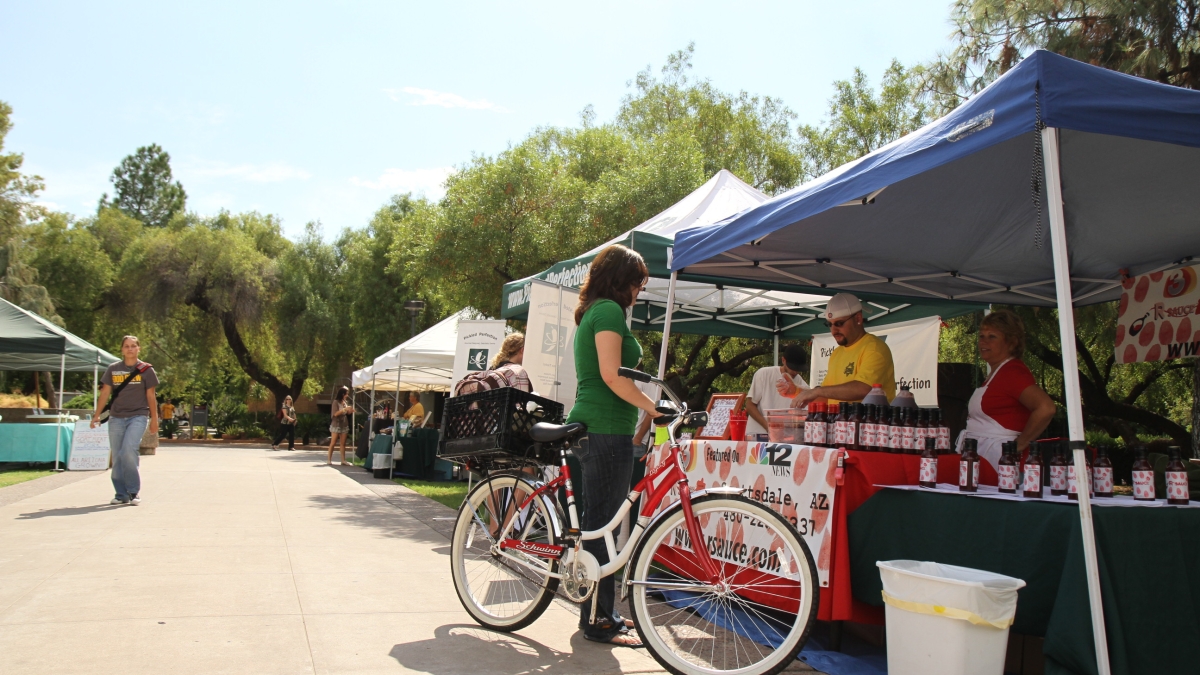ASU programs among Best Green Campus Projects of 2012

Colleges and communities looking to implement sustainability programs can find inspiration from case studies. Two Arizona State University programs were recently added to the National Wildlife Federation’s searchable Campus Ecology database, which includes case studies of exemplary sustainability programs from across the United States and Canada.
Programs featured in the database provide fresh ideas and best practices for campus sustainability. Among the best ideas for 2012 were ASU’s Farmers Market @ the ASU Tempe campus and its Sustainable Cities Network. The two programs join seven other ASU case studies featured over the past 10 years.
Farmers Market promotes healthy, sustainable eating
As a 2011-2012 selection in the Farming and Gardening category, the Farmers Market @ the ASU Tempe campus case study provides a shining example for other colleges and universities looking to implement campus farmers markets. The farmers market was included in the database for its unique way of making sustainable, local and healthy food available to hard-working students, faculty and staff right at their place of work.
Already in its third season, the farmers market has valuable lessons for other campuses. Partnerships, locations and marketing can help an on-campus farmers market thrive.
“Inter-campus and food service provider partnerships are important; markets located in the heart of campus are more likely to be successful; prepared foods help vitalize the market; and a variety of communication methods is critical,” says Lombardo.
Last year alone, the market grossed $84,000 in sales during only a dozen of business days, making ASU’s Farmers Market one of the most successful university farmers markets in the nation.
Lombardo hopes the Campus Ecology case study designation will encourage other campuses to follow suit and even streamline the process.
“By describing our methods, we can inspire similar success at other campuses where the infrastructure of the surrounding community will support it,” she says.
Sustainable Cities Network fosters collaboration
The Sustainable Cities Network, an initiative started by ASU’s Global Institute of Sustainability, is a 2011-2012 selection for Environmental Education or Outreach.
The network brings together cities, towns, tribal nations and county governments to share and track best practices in sustainability, provide training and information, and create a bridge between ASU's research and front-line challenges of sustainability.
“Through cities participating in working group meetings, sharing lessons learned, and encouraging collaboration, the network helps accelerate local community sustainability efforts and pushes Arizona toward national leadership in sustainability,” says Anne Reichman, the Sustainable Cities Network program manager.
It’s a model that can be replicated in communities across the country. The network’s workgroups tackle sustainability challenges associated with green infrastructure, solar and energy efficiency, and water resources. Each workgroup is comprised of government officials and practitioners that have expertise and local knowledge about the particular concern.
“The combined knowledge and experience within each group makes for a unique understanding and palette of solutions to environmental, social and economic sustainability challenges,” says Reichman.
The NWF Campus Ecology Sustainability Case Studies
For 20 years, the National Wildlife Federation’s Campus Ecology program has been collaborating with universities to develop and maintain excellent examples of campus sustainability education, practice and outreach. These examples – or case studies – eliminate redundancy and provide helpful networking opportunities across the country. The Campus Ecology program features an interactive map that locates existing sustainability initiatives at universities across the country.
Since 2001, ASU has provided nine case studies for education, outreach and practices, as well as innovative fellowships that give students real-world experience in campus sustainability initiatives.
To find out more about NWF’s Campus Ecology program and ASU’s present and past case studies, visit www.nwf.org/Campus-Ecology. To learn more about the Best Green Campus Projects of 2012, visit http://blog.nwf.org/2012/11/112-green-projects/.